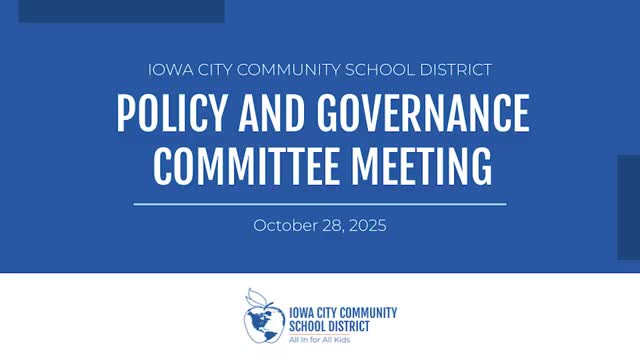Policy committee backs ISB committee regulation, debates recusal language and member limits
Get AI-powered insights, summaries, and transcripts
Subscribe
Summary
The Policy & Governance Committee of the Iowa City Community School District on Tuesday reviewed updated committee policies and recommended adopting the ISB regulation for advisory committees while debating mandatory recusal language and member limits.
The Policy & Governance Committee of the Iowa City Community School District on Tuesday reviewed updates to district committee policies and recommended adopting the ISB regulation for advisory committees in place of an older local guideline.
Committee chair called the meeting to order and turned the discussion over to staff member Chase, who told directors the proposed changes were largely housekeeping and reflected state and ISB updates: "we were actually a bit ahead of the curve," he said, noting the district92s older guideline and the ISB92s 208 R1 regulation could create duplication.
Directors focused on three practical issues: whether the board or the superintendent appoints advisory-committee members, whether committee members would face the same open-meetings or training requirements as board members, and whether advisory members should be limited to serving on only one committee at a time. Chase said the draft allows member appointments by either the board or the superintendent and that staff would follow up with legal on training requirements. He also noted that the district92s existing practices (for example, an insurance committee with a board representative) would generally fit the regulation.
The committee reviewed a revised member-selection flowchart added to policy 203.01 and discussed recusal language for cases in which a committee participant later appears before the board in a quasi-judicial capacity. Legal counsel advised the board "it is within the purview of the board to set its rules about how it's going to govern itself," Chase summarized, adding that the provision "doesn't have to be a shall. If the board doesn't want to, it could be a may."
Directors disagreed over tone and effect. One director argued that making recusal mandatory ("shall") sets clear expectations for members who sign up to participate; another said permissive language ("may") preserves flexibility and avoids locking future boards into a rigid rule. Several directors stressed the importance of equal information: if some board members receive substantially more information about an issue in advance, that could create fairness concerns for later quasi-judicial hearings.
The committee also debated a provision in the district guideline that limited advisory members to serving on a single committee at a time. That restriction was originally intended to broaden community participation after a period in which the same volunteers sat on multiple panels. Directors noted practical trade-offs, including staffing needs when a director or staff member (for example, a director of secondary education) would be helpful to multiple study groups.
After discussion, staff and members said they would recommend moving forward with the ISB regulation (208 R1) as the base text and carrying over any locally useful provisions from the guideline. The committee agreed to treat the meeting as a first reading of the revised policies, requested a clean draft for November, and planned to return for a second reading and a final vote at a later board meeting.
Procedural motions: the committee approved the September minutes by voice vote during the meeting's opening and later approved adjournment by voice vote.
